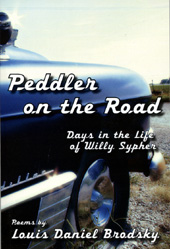

Peddler on the Road
Days in the Life of Willy Sypher
Hardback and Paperback: 120 pp.
Published: 2005
Price: $22.95, $14.95
BUY THE BOOK from Amazon.com
In Peddler on the Road: Days in the Life of Willy
Sypher, Louis Daniel
Brodsky sets forth a series of poetic vignettes about one Jewish traveling
salesman's journeys as a representative for a major Midwest manufacturer
of men's dress clothing, depicting the odyssey of a fifty-year career
devoted to the road and to the small towns that define it.
This novel, in fifty-two poems, is told both by an omniscient narrator
and by Willy Sypher himself. We follow Willy's progress, from the time
he joins Acme-Zenith Clothing, of St. Louis, in 1938, to his languishment
in a nursing home, at century's end. In five chapters, each covering
about a decade and a half, we see Willy advance into his prime, in the
forties, fifties, and sixties — full of pep, tackling seven states,
in two sales territories, and believing himself to be unstoppable — and
then suffer the inexorable loss of his energy, the shrinking of his client
base, and the ultimate inertia of old age.
This is not one man's story of achieving the American Dream, nor is it
about his succumbing to the disillusionment of eking out a living; rather,
it is the tale of a dogged, proud individual determined to stay even,
survive, day to month to year, against fierce competition not only from
others in his trade, not only from the rigors of road travel itself,
but, perhaps most significant, from the forces of prejudice and intolerance.
Reading Peddler on the Road, you will meet a genuine American hero, the
unsung kind that, though all but faded into myth, once invigorated the
national landscape, with optimism and faith in the worth of the common
man.
Praise:
No achievement in his poetic career exceeds Louis Daniel Brodsky's creation of Willy Sypher, a Jewish travelling salesman for a Midwestern manufacturer of men's clothing. . . . No poet at work today has a more . . . passionate regard for the infinite worth of the experience of being alive.
— Lewis P. Simpson, author of The Dispossessed Garden
Mr. Brodsky obviously references two American classics with his title: "Fiddler on the Roof" and Arthur Miller's Willie Loman of "Death of a Salesman" (which is mentioned with disdain). And perhaps another, "The Music Man," with its opening of the traveling salesmen discussing trade: "But you better know the territory" — and in the patter of "the pitch."
Willy Sypher is a vanished breed: the Jewish, Midwestern, traveling purveyor of a menswear line. The poems trace in chronological order Willy's tales of road life: loneliness and lust, prejudice and pals. It takes a certain kind of person to endure the ups and downs of sales. Mr. Brodsky nicely covers the mood swings, the inner life, the existence of someone only as good as his next sale fighting natural and man-made elements for a righteous piece of the pie. The poet reminds us that small-town America was often less than pleasant places for outsiders (Jews among the least popular) throughout most of the 20th century (of course now the born-agains are hoping the Israelis kick off Armageddon to bring on "the rapture"). As someone who has sold a few suits himself, Mr. Brodsky is well-acquainted with the terms, travails, and jargon of the garment business.
— Iconoclast
Brodsky has given Willy the proper language in
which to make his case before the world. Willy has a sense of humor, a
sound sense of the world, and a quiet pride in himself. The language that
he speaks may sound merely commonplace, but Willy is speaking poetry, for
poetry is language that in its exactitude, its rhythm, its descriptive
power, its precision of tone, is doing its job perfectly.
— Cleanth Brooks, author of The Well Wrought Urn
BUY THE BOOK from Amazon.com
Making for Port
All week, he's cruised beyond familiar depths,
Between shoals, reefs, atolls,
To wider reaches than any previously achieved
In the great Midwest/South inland ocean
He's charted these past sixty semiannual seasons.
Now, at Friday's dusk, he turns,
Completes a broad gyre, begins his retreat
By navigating Highway 55, north,
One of the two main sea lanes in his territory.
Loaded with dusty, dog-eared swatch books,
Rumpled size-34 sample pants,
Random soiled sportscoats, and a few three-piece suits
Representing spring '69, Willy returns —
The company's perdurable mariner,
Their indispensable Jew fisher of men,
Solitary Ahab, ragged ragman,
Who's schlepped his bag of raiment-bait,
From port to port, door to door, thirty years.
Tonight, humiliation rides beside him.
Having written only three scanty orders,
Totaling five hundred offshore-assembled safari shorts,
Carrying 2 percent commission,
Which will barely cover gas, motel, meals,
Make no dent on his monthly utilities and rent,
Willy senses the specter of another desolate weekend
Looming, like a gargoyle, over his building's entrance.
He dreads having to tell Leah of his meager catch.